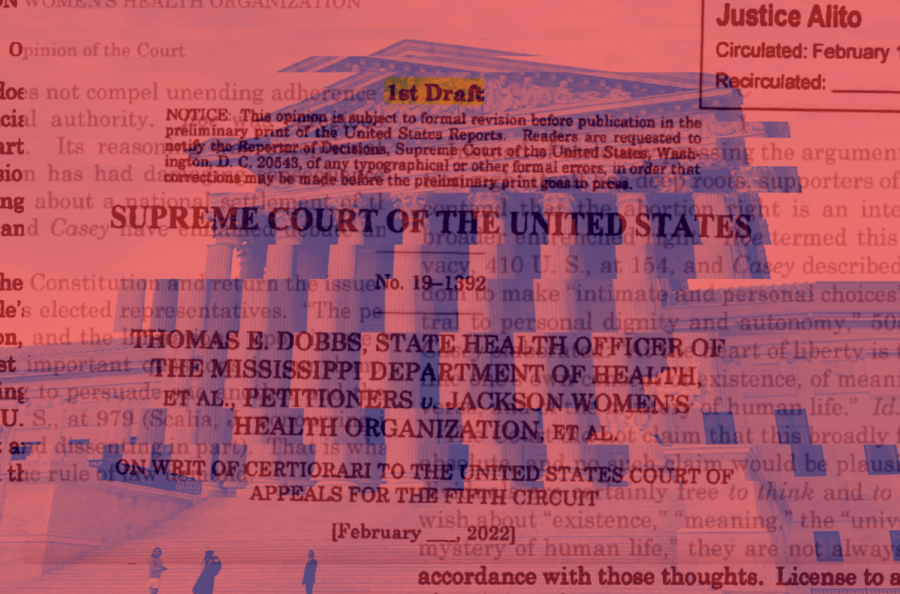A step backwards: The Supreme Court’s decision will strip women of their power
Credit: Alyssa Ao
WSPN’s Kally Proctor and Reva Datar discuss the leaked Supreme Court draft that could overrule Roe v. Wade.
While women’s health in America has been jeopardized and used as a political tool, politicians use the topic of abortion to garner support for their political campaigns. They continue to make promises at the expense of many women’s health in America or make promises they may never fulfill.
In early December of 2021, the Supreme Court of the United States heard the case of Dobbs v. Jackson Women’s Health Organization. This case dealt with the issue of a Mississippi law banning abortion at 15 weeks of pregnancy, and they are now seeking to overturn the decision made in the landmark case of Roe v. Wade. While there are several different aspects of this case, the one that stands out the most is the decision the Supreme Court will have to make on whether or not to ban a woman’s constitutional right to abortion. Not only are their rights under question, but the Supreme Court could hold the authority to deny women the power to make this decision themselves.
Roe v. Wade and Planned Parenthood v. Casey are two of the most controversial cases in Supreme Court history, where the court held the ability to decide whether women have the right to an abortion and decide what happens to their bodies. The topic of abortion in this country has always sparked intense debate between those who are “pro-life,” people in support of anti-abortion laws, and those who are “pro-choice,” people who support opportunities for women to get abortions. These “pro-choicers” have been protesting outside the Supreme Court since the draft was leaked.
Although the actual decision date for this case falls in mid-to-late June, on May 2, 2022 an early draft written by the Supreme Court was published by Politico. The contents of this draft held what was for many a shocking and disgusting resolution: “We hold that Roe and Casey must be overruled.” These nine words are supported by 98 pages that show the Supreme Court’s majority vote in favor of overruling Roe v. Wade.
Though politics makes issues seem more complicated and harder to understand, it is clear what the prospect of overruling Roe means: the banning of legal abortions and an increase in illegal ones that put women’s health and lives at risk.
Combating illegal abortions means reinstating legal ones, and so the cycle continues. No matter how many men try to write it off, the need for abortions will never go away.
Whether abortion is needed due to the woman’s age, health or whatever situation they might end up in, the necessity for it will always remain, therefore, abortions will always happen one way or another. The Supreme Court is using its power to decide what type of abortions American women will have access to. Here, the pro-life sentiment has no solvency, and in fact, heightens dangerous operations by creating circumstances in which there is no choice for women but to get an illegal abortion.
Indeed, many of those who call themselves “pro-life” and claim to care about human lives are oftentimes the ones lobbying against mandatory mask wearing, vaccination and stricter gun regulation laws. This is especially baffling since it has been proven that wearing a mask and getting vaccinated help both you and others around you. On the other hand, getting an abortion would only affect the person who is receiving it and the unborn fetus. As a result, many conservatives’ ideals are, in practice, conflicting and hypocritical.
In some situations they argue that one cannot be told what to do with their body, yet in other situations, they aim to control what others can do with their bodies, a belief which represents hypocrisy at its finest.
Similarly, it seems that in some cases conservatives will respect one’s bodily autonomy at the cost of others, while in different circumstances they argue that this is immoral. Perhaps the best example of this is that of an organ donor. If someone does not sign up to be an organ donor after death, then doctors legally cannot use their organs. What if someone on the transplant list is going to die if they don’t receive this organ? Even in this case, the will of the deceased is honored, and their bodily autonomy is respected, even at the cost of another living person. However, in the case of abortion, many of those who are “pro-life” argue that to get an abortion is to take the unborn fetus’s life.
Aside from conservatives’ belief that abortions are murderous to the unborn child, there is another line of logic that people use to argue that Roe v. Wade should be overruled. They believe that this case should never have been decided by the Supreme Court back in 1973 in the first place, since it did not directly challenge what was written in the Constitution. In fact, the dissent written by Justice Alito used this argument as one of the core reasons as to why the decision must be overruled.
Even though the Constitution did not include mentions of abortion, does not mean that the Supreme Court cannot decide that it is a right. Many of the Founding Fathers themselves had owned slaves, lived in a time when women could not vote and anything other than heterosexuality was considered a sin. Yet, now we have laws that tell us that it is a human right to receive equal treatment on the basis of race, sexuality and gender orientation, among other things.
Simply because something was not initially included in the Constitution does not automatically mean that it is unconstitutional to later decide that it is a right. The Constitution was made with the ability to be amended for the sole purpose that laws could evolve and change as times did. The views we once held in the past should not dictate our laws now.
This argument that the decision should be overturned comes from a judgment that overturning it now would reverse a bad decision that should not have been made in the first place. However, it isn’t so simple because Roe v. Wade has become one of the pillars for women’s rights in this country. A reversal of the decision would shake the foundation of women’s health and set a precedent for states to impose harsher abortion laws.
In fact, 13 states already have “trigger laws” on the books that would take effect once the court strikes down Roe v. Wade. That means that in those states – specifically Arkansas, Idaho, Kentucky, Louisiana, Mississippi, Missouri, North Dakota, South Dakota, Tennessee, Utah, Texas, Oklahoma and Wyoming – abortions would automatically be banned in the event that Roe is overturned.
One of the main goals of Roe v. Wade was to make abortion accessible for everyone, which would not be true if women had to travel out of state to get one. Not all women have the resources needed to travel out of state abruptly in order to receive an abortion. Some may be living in situations where leaving their homes is difficult or entirely not possible.
While a woman’s right to control her own body and make her own decisions is at the essence of the “pro-choice” argument, the reasoning in the Supreme Court’s draft focuses on the lack of relevance abortion has to the Constitution. Overruling a decision that has impacted society and women’s health policies for 50 years cannot simply rectify a “bad mistake.” Indeed, overruling Roe v. Wade would ultimately make abortion and pregnancy in general more dangerous for many women. Taking away a crucial part of women’s rights by denying them the ability to make a decision about their own bodies will take our country back centuries.
Your donation will support the student journalists of Wayland High School. Your contribution will allow us to purchase equipment, cover our annual website hosting costs and sponsor admission and traveling costs for the annual JEA journalism convention.

Kally Proctor, Class of 2024, is a third year reporter and co-features editor for WSPN. She is captain of the high school’s mock trial team and tennis...

Reva Datar, Class of 2025, is co-editor-in-chief of WSPN and a fourth year reporter. Previously, she was the Opinion editor and News and Opinion copy editor...

Alyssa Ao, Class of 2025, is a co-graphics editor for WSPN. She is also one of the Math Team captains and co-president of the Art Club. Outside of school,...





![Last Wednesday, the Wayland School Committee gathered to discuss a number of topics regarding the health curriculum and Innovation Career Pathway course. Another large topic of conversation was the ways to potentially mitigate distracting cell phone usage. "These [phones] are going to distract your learning and social relationships," Superintendent David Fleishman said. "That's concrete right there."](https://waylandstudentpress.com/wp-content/uploads/2025/06/Screenshot-2025-06-04-at-9.49.31 PM-1200x886.png)



























![Troy Hoyt finishes the Boston Marathon, running for the Hoyt Foundation. T. Hoyt is the son of Hoyt Foundation CEO Russ Hoyt.
“[Running a marathon] might seem like a big thing, when it’s presented to you at first, but if you break it up and just keep telling yourself, “Yes, you can,” you can start chipping away at it. And before you know it, you’ll be running the whole 26 miles, and you won’t even think twice about it.” T. Hoyt said.](https://waylandstudentpress.com/wp-content/uploads/2025/04/C36E8761-1CBB-452E-9DF2-543EF7B1095E_1_105_c.jpeg)












































Susan Montague • May 23, 2022 at 3:48 PM
Very thoughtful, well-written commentary. Very mature perspective.